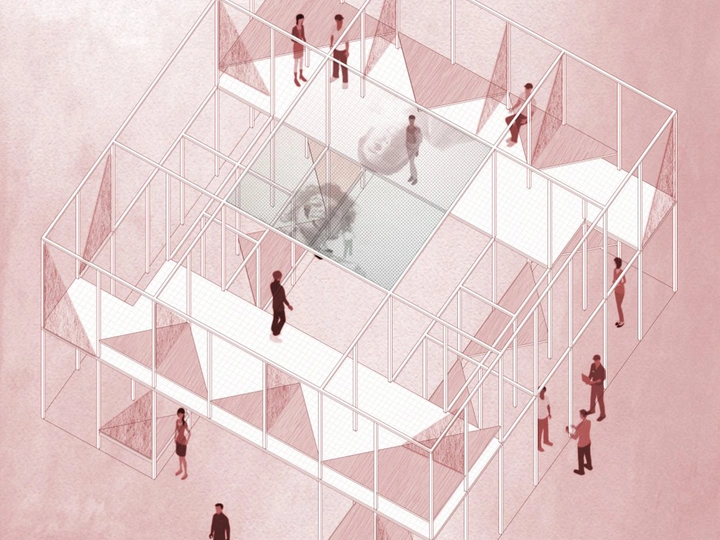Performative Architectures for Collective Futures

I am Adela Bravo Sauras, an architect, performance-maker, and researcher based in Berlin, where I work as Wissenschaftliche Mitarbeiterin at the Technische Universität Berlin and lead the interdisciplinary group NoFourthWall. My practice lies at the intersection of architecture, theatre, and performance, focusing on how built, performative structures generate new forms of encounter, perception, and participation.
With a Master’s degree in Applied Theatre Studies (Justus-Liebig-Universität Giessen) and a background in architecture, I am currently completing my PhD at the Universität der Künste (Berlin), researching “Architectonic Theatre” - the architectonic turn in contemporary performance and how spatial devices transform theatrical and social experience.
As a practitioner, I have worked as a scenographer, director, and architect, presenting projects across Germany and Spain, including My Hands. My Mother’s (Gießen, Berlin, Madrid), a large-scale immersive installation exploring intimacy and collective memory. I was part of the Rivas Cherif Program at Spain’s Centro Dramático Nacional and have collaborated with institutions such as Mousonturm Frankfurt, FFT Düsseldorf, and the Schaubühne Berlin.
My academic and creative work has been shared in international forums, including the IFTR Theatre Architecture Working Group (member since 2015), and I co-edit a forthcoming publication on architectural pedagogy (Grundlehre, 2026). My current focus is developing performative architectures - temporary, built environments that dissolve the boundary between audience and stage, turning space itself into a dramaturgy and fostering communities of shared, embodied experience.
Performative Architectures expands my doctoral research (Architectonic Theatre: The Architectonic Turn in Contemporary Western Theatre and the Transformation of Architectural Reality through Performative Mechanisms, 1970-2024, UdK Berlin, supervision: Prof. Dr. Susanne Hauser) and my transdisciplinary teaching at TU Berlin (courses such as Scenictecture, To Build or Not To Build, Zusammen_Kommen, and the new module Performative Architectures).
Rooted in my practice with NoFourthWall (fourteen architectonic theatre projects since 2009), this project critically examines how designed, temporary, inhabitable structures - conceived as dramaturgical, social, and political agents rather than static scenography - can foster collective agency, resilience, and dialogue across cultural and urban contexts.
The proposal unfolds across four strands:
• Urban Performance Labs: Co-design workshops with civic actors, students, and Berlin cultural institutions (Volksbühne, Schaubühne, Sophiensaele, Ballhaus Ost) to prototype temporary performative structures in public space.
• Dialogue Series: Interdisciplinary seminars with leading international practitioners (Dorita Hannah, Juliette Rufford, Cathy Turner, TAAT, Diller Scofidio + Renfro, Zuloark), archived as a freely accessible video resource.
• Visual Atlas: A dynamic, interactive mapping of case studies, prototypes, and dialogues as both a public interface and pedagogical tool.
• Future Platforms: Foundations for a nomadic Architectures in Performance summer school (launch 2027) and a co-curated proposal for the Prague Quadrennial 2027 on “Absences and Silences: Scenographic Futures.”
By merging academic research, participatory design, and artistic experimentation, Performative Architectures offers a flexible framework adaptable to residencies, festivals, exhibitions, and labs across the LINA network, supporting spatial practices as tools for collective cultural and ecological transformation.